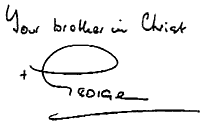|

Pastoral Letter to the Communion
August 13, 1998
My dear Sisters and Brothers
Just a few days ago the 13th Lambeth Conference, which brought together 750 Bishops and 650 spouses from the 37 Provinces of the Anglican Communion, ended. Thanks to the prayers of many, and the work of the Holy Spirit in our midst, the vast majority of those present agreed that it had been very worthwhile, with much blessing resulting from our common worship, study and dialogue--blessings which, I know, were experienced as much in the Spouses Programme as in the Bishops' Conference.
At the heart of our Conference was our daily Bible study, in small groups, of Paul's Second Letter to the Corinthians, which we looked at under the title Leadership under Pressure--something which all of us could, I think, readily identify with. As we did so, I was struck by St Paul's emphasis on 'faces': The glory on Moses' face after he had met with God (3:12); the transforming glory on our faces when we turn to God (3:18) and then in 4:6, that wonderful passage where Paul speaks of the light which has shone in our hearts 'to give light of the knowledge of the glory of God in the face of Jesus Christ'.
And we have been transformed by being together over these three weeks. We have seen one another's faces. People who we might only have heard about in the past are now people we know as friends, whose faces are known to us. And many of us will never be the same again because we have been enriched by the stories those people have shared with us, of leadership under pressure, and of the goodness of God sometimes in the context of great hardship, poverty and persecution, or elsewhere, of secularity and indifference. How could any of us forget the Bishop of Kitgum's simple but moving account of the death of his beloved wife, Winifred, blown up by a landmine? And who was not challenged by his courage in maintaining a faithful witness in an area where terrorists regularly abduct children and take them away to be trained as killers? Such an account is a vivid reminder of the context in which some of our brothers and sisters work as bishops and Christians.
In listening to each other and sharing common concerns we have also seen the face of the world in its agony and confusions. We have taken time together to study carefully some of the profound and perplexing problems which the Provinces had requested for our agenda. Some of these problems press hard only on some parts of our Communion but they must be of concern to us all as members of one family. The burden of international debt; the changing pattern of interfaith relations; the making of moral decisions in an increasingly relativistic climate; the need as a Church to bring peace and reconciliation in those parts of the world threatened by civil strife; the impact of technology on us all -- all these were looked at in depth and our Report and Resolutions reflect that fact. (These will be available in due course) What is more, we believe we made considerable progress in addressing these issues as we listened to each other in the context of scripture and the experience of the Communion; and the fruit of our discussions will, I hope, become evident in days to come. Of particular significance, I believe, is the issue of International Debt, and much more will flow from our commitment to press the moral argument for the relief of the burden of unpayable debt.
But there have been times when 'face to face' encounter has been difficult and potentially divisive. This was particularly so with regard to our discussions about human sexuality. Prior to the Conference no Province had asked for homosexuality to figure as a major item on the agenda, but, nonetheless, the issues was debated hotly and we found that our diversity of theology and culture, often a source of blessing, was becoming a 'differing' that could so easily have resulted in bitter confrontation.
But the result of those discussions was a Resolution, passed by a huge majority, that 'this Conference, in view of the teaching of Scripture, upholds faithfulness in marriage between a man and a woman in lifelong union, and believes that abstinence is right for those who are not called to marriage'. In the same Resolution we also affirmed that we would 'commit ourselves to listen to the experience of homosexual persons and we wish to assure them that they are loved by God and that all baptised, believing and faithful persons, regardless of sexual orientation, are full members of the Body of Christ'.
For the vast majority of us involved in that debate the friendships that had been established, coupled with a desire to listen to each other, enabled us to transcend our differences. Nevertheless, I recognise that for some parts of the Church, there was considerable pain to be endured both in the debate itself and its outcome and so the listening must go on, not only to Scripture but also to one another.
And the fact of division in the world and the Church is surely something that we should face up to with courage and faith. So much energy goes into maintaining divisions instead of working for unity, It is my strong belief that one of the greatest benefits of this Conference will be our experience as bishops of pursuing a oneness of aim in the midst of diversity, That, I believe, has strengthened rather than weakened our Communion.
But, if we have looked at the difficulties facing our Churches we have also perceived the effects in many Provinces of the Decade of Evangelism that was so wonderfully brought to our Communion by the last Lambeth Conference. We give thanks to God for all that has been achieved. We affirm under God that the Decade of Evangelism does not end in two years' time! Rather, the 201st decade begins then! The Millennium will, I believe, provide a unique opportunity of telling the story of Jesus Christ afresh to our world. Let every diocese aim to present our Lord as Saviour and Hope of the world and let us all seek to bring people to baptism and new life in Christ.
For through this marvellous Conference we have begun to see some of us for the first time, the growth and the vigour of the Communion. Anglicans are at work among the very poor as well as among the most privileged. We have thus gained insights into our interdependence as Provinces. We know now that we must ensure that our structures are more accountable; we know that we must find new ways of supporting the poorest parts of the Communion (often rich in faith and joy); we know that we must become a more outward looking and serving Communion; we know that we must share together our resources in training and Biblical scholarship.
And strengthened by our fellowship together we return to our diocese more ready to serve that Communion and all its members. Thank you, brothers and sisters, for making it possible for us to meet in Canterbury, because in meeting here we believe we have glimpsed something precious of the glory of God in the 'face of Jesus Christ' and the nature of a serving ministry which comes from following him.
And in the words of St Paul, from that letter which challenged us so very deeply, we salute you from the Lambeth Conference: Finally, brothers and sisters... put things in order... agree with one another... live in peace and the God of love and peace will be with you.
May God bless you in our faith and life together.

|